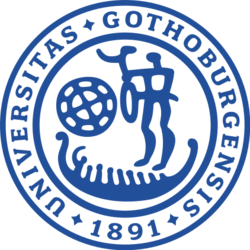University of Gothenburg
(University) | |
|---|---|
 | |
| Motto | Tradita innovare innovata tradere |
| Formation | 1891 |
| Headquarters | Gothenburg, Sweden |
| Type | Public |
| Subgroups | Gothenburg School of Business Economics and Law |
| A strong tradition of research innovation | |
The University of Gothenburg (Göteborgs universitet) is a university in Sweden's second largest city, Gothenburg.
The University is the third-oldest of the current Swedish universities and with 37,000 students and 6000 staff members[1] it is one of the largest universities in the Nordic countries.
About
With its eight faculties and 38 departments, the University of Gothenburg is one of the most wide-ranging and versatile universities in Sweden. Its eight faculties offer training in the Creative Arts, Social Sciences, Natural Sciences, Humanities, Education, Information Technology, Business, Economics and Law, and Health Sciences.
The University of Gothenburg has the highest number of applicants per study place in many of its subjects and courses, making it one of the most popular universities in Sweden.
History
The University of Gothenburg was founded as Göteborgs högskola (Gothenburg University College) in 1891. In 1907 it was granted the same status as Uppsala University and Lund University by the Swedish government, thus creating Sweden's third university.
Over the course of time, it has merged with a number of previously independent higher education institutions in the city and has continuously expanded its study profile. It was granted the rights of a full university by the Swedish Government in 1954, following the merger of the Göteborgs högskola (Gothenburg College) with the Medicinhögskolan i Göteborg (Gothenburg Medical School).[2]
In 1971, the originally separate Gothenburg School of Economics and Commercial Law became part of the University of Gothenburg.
Sahlgrenska University Hospital is associated with the university as a teaching hospital. The Sahlgrenska Hospital was founded in 1772 following a donation by Niclas Sahlgren, and is the largest in Northern Europe.
In the 1990s the School of Economics and the Academy of Music, Drama and Opera have moved to new buildings in the city centre. A new campus for the Faculty of Education (teacher training) was opened in central Gothenburg in 2006.
The University of Gothenburg is a pronounced city university, that is most of its facilities are within the city centre of Gothenburg. The main building as well as most faculties are located in the central part of Gothenburg.
Gothenburg has a great academic excellence, originating from the University of Gothenburg, Chalmers University of Technology and the Sahlgrenska University Hospital, to face these challenges. It has a strong tradition of innovation, resulting in for example Losec, the Brånemark implant, drugs against Parkinson's and most recently, the first ever completed pregnancy from a transplanted uterus. Together with Uppsala, Lund, and Stockholm universities, it is one of four large international research universities in Sweden.
Alumni on Wikispooks
| Person | Born | Nationality | Summary | Description |
|---|---|---|---|---|
| Hans Bergström | 13 May 1948 | Sweden US | Journalist Editor | Swedish-American journalist and editor |
| Nick Bostrom | 10 March 1973 | Sweden | Philosopher | Sweden philosopher who first attended the Bilderberg in 2019. |
| Cecilia Malmström | 15 May 1968 | Deep state functionary | European Commissioner for Trade 2014-2019 | |
| Oscar Stenström | 1975 | Sweden | Civil servant Deep state operative | Swedish civil servant who negotiated the Swedish accession to NATO. Went to his first Bilderberg in 2023. |
References
- ↑ facts and figures University of Gothenburg
- ↑ http://www.gu.se/english/about_the_university/Introduction/history/